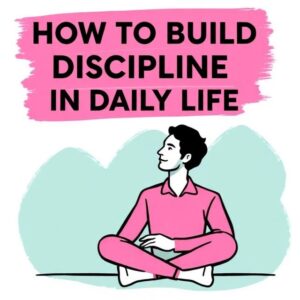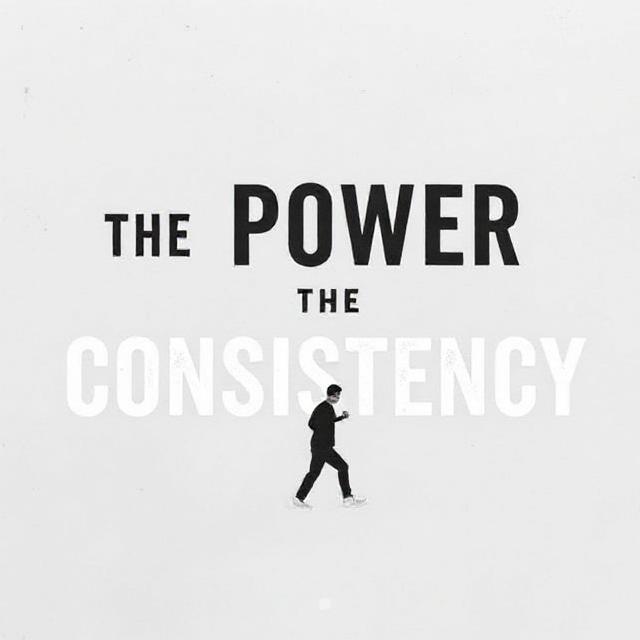
Quick Overview
- Understand discipline vs motivation
- Set non-negotiable rules for yourself
- Use the “Do It Anyway” mindset
- Apply time-blocking to control your day
- Remove decision fatigue by planning ahead
- Delay comfort to build mental toughness
- Track your actions, not your feelings
- Use self-accountability routines
Why Discipline Matters More Than Motivation
Motivation is temporary. It comes and goes based on mood, weather, energy, and emotion. Discipline is consistent action, even when you don’t feel like it. If you rely on motivation, you’ll only take action occasionally. If you rely on discipline, you’ll take action daily, and that is where results come from.
Discipline means doing what needs to be done, especially when you don’t feel like it.
Step 1: Define Clear Rules — Not Just Goals
Most people set goals, but goals depend on motivation. Discipline depends on rules. Rules tell your brain what is non-negotiable.
Instead of saying: “I want to read more this year.”
Say: “I read 10 pages every night before bed. No excuses.”
Rules create structure. Structure builds discipline.
Step 2: Use the “Do It Anyway” Principle
Discipline grows when you ignore feelings and focus on action. When your mind says, “I don’t feel like it,” respond with: “Do it anyway.”
- Don’t want to work out? → Do 5 minutes.
- Don’t want to study? → Open the book and read one page.
- Don’t want to wake up early? → Stand up immediately when the alarm rings.
The more you act without negotiating, the stronger your discipline becomes.
Step 3: Control Your Day with Time-Blocking
A lazy day happens when there is no plan. Time-blocking means dividing your day into focused time sections. Each block has a single purpose — no multitasking, no guessing.
Example time blocks:
- 7:00 AM – 7:30 AM → Morning routine
- 7:30 AM – 8:00 AM → Workout / stretch
- 9:00 AM – 12:00 PM → Focus work or study
- 8:00 PM → Reflection/personal growth
When your day is structured, discipline becomes automatic. Free time is earned, not given.
Step 4: Plan Tasks the Night Before
Decision fatigue kills discipline. When you wake up without clarity, your brain delays action. Plan your top tasks before sleeping.
Write:
- One priority task
- One secondary task
- One personal discipline action (like reading, exercise, journaling)
When your mind wakes up knowing what to do, action happens faster.
Step 5: Delay Comfort Intentionally
Comfort is the enemy of discipline. Instead of removing comfort completely, delay it.
- Want to check your phone? → Work for 20 minutes first.
- Want to relax? → Finish one productive action before resting.
- Want a reward? → Earn it through effort, not emotion.
Delayed gratification builds mental strength, which is the core of discipline.
Step 6: Track Actions — Not Feelings
People say, “I didn’t feel like it today.” Feelings do not matter in discipline. Track your actions only.
Make a simple tracker:
- Did I wake up on time? ✅ / ❌
- Did I complete my top task? ✅ / ❌
- Did I stick to my time blocks? ✅ / ❌
Tracking removes emotional excuses and turns discipline into a measurable habit.
Step 7: Apply the “No Zero Days” Rule
A zero day is when you do nothing toward your goals. Discipline grows when you show up daily, even with small effort.
- If you don’t want to work out → Do 10 squats.
- If you don’t want to read → Read one paragraph.
- If you don’t want to write → Write one sentence.
The goal is to keep momentum alive.
Step 8: Build a Personal Accountability System
Discipline increases when someone — even you yourself — is watching. Create self-accountability rules:
- Write your progress publicly or in a private log.
- Set consequences — no entertainment until tasks are done.
- Weekly review — check what you did right and where you got lazy.
When actions are recorded, excuses lose power.
Step 9: Create a Morning Discipline Trigger
The first decision of your day sets your tone. Build a discipline trigger:
- Wake up and stand immediately
- Say out loud: “Action first, comfort later.”
- Start your first task within 10 minutes of waking up — no scrolling, no thinking.
Taking action early shuts down laziness for the rest of the day.
Step 10: Understand That Discipline Is Built, Not Born
Nobody is born disciplined. It is a skill, and like any skill, it improves with practice. Each time you act despite laziness, your discipline muscle grows.
FAQ Section
Q: I start strong but quit after a few days. What should I do?
Stop depending on motivation. Track your streak and focus on showing up daily, even at a smaller scale.
Q: How long does it take to become disciplined?
Small consistency over 30 days changes your behavior. Discipline becomes natural once you repeat the same action until it feels automatic.
Q: What if I fail and break my streak?
Restart immediately. Discipline is about recovery speed, not perfection.



